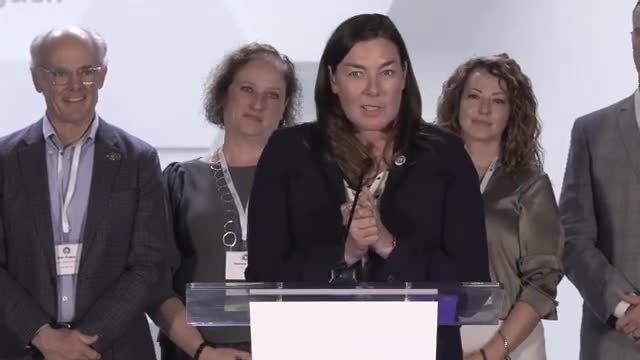Utah League presenter urges stronger caucuses, more outreach and ‘unstructured hangout time’
Get AI-powered insights, summaries, and transcripts
Subscribe
Summary
An unnamed presenter at the Utah League of Cities and Towns conference outlined priorities for the coming year, urging improvements to caucus naming and function, more city-to-city knowledge sharing and informal relationship-building with state partners.
An unnamed presenter at the Utah League of Cities and Towns conference said the coming year will focus on strengthening caucuses, expanding city-to-city knowledge sharing and creating more opportunities for informal relationship-building with state and local partners.
The speaker said caucuses — small groups of cities and towns that share problems and solutions — are critical to identifying unifying themes and practical policies for municipalities. The presenter singled out the “established mid sized city caucus” as “the worst named caucus of all the caucuses” and said they will test the new label “best cities caucus” while soliciting feedback from members.
Why it matters: caucuses serve as a conduit for local government to share best practices on issues ranging from filming ordinances to drought-responsive landscaping. The presenter described the League as a 255-city network that enables officials to seek practical help from peers in Park City, Draper, St. George and other Utah cities.
The presenter emphasized two main priorities. First, strengthening caucuses so they can compile local concerns and solutions to bring to the state level. Second, prioritizing informal, unstructured interaction among elected officials and staff — what the presenter called “unstructured hangout time” — as a way to build trust and find common ground for difficult topics. The speaker said such informal time can turn “small nuggets” of shared experience into the basis for larger cooperative efforts.
The remarks included several informal examples of peer-to-peer problem solving: consulting Park City on filming ordinances; asking Draper about trail master plans; and contacting St. George for advice on water-wise landscaping during drought. The presenter also noted that cities often provide emotional and practical support after difficult public meetings, citing friends in Mapleton as an example.
The speaker described personal routines and anecdotes to underline the themes. They said many mornings begin with calls or texts from “mayor Walker,” sometimes about policy issues and sometimes simply social; the presenter recounted preparing for a speech with Walker’s input. The speaker also joked about wearing a weighted vest during early-morning walks and recounted an informal mountain-bike outing that built trust with a county commissioner.
The presenter said League staff are eager to be “out and about” in member cities and pledged to spend the year visiting communities, sampling local restaurants and trails, and sharing city stories with state legislators. The remarks did not propose specific legislative measures or formal votes.
The presentation focused on relationship-building and peer assistance as tools for municipal problem-solving and signaled an emphasis on outreach and caucus reform in the coming year.
